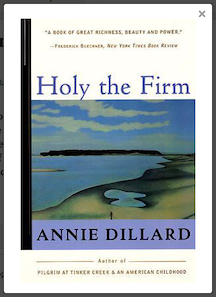Last month, we touched on the concern that “introducing complication” into your manuscript might come across as a predictable literary device to fix flat writing. Let’s wrestle a little more with that concern.
 The attraction of complication is deeply rooted in the human brain. That reality doesn’t destine this tool to become base or crass. It can be highly contemplative. Read Annie Dillard’s transcendent work Holy the Firm for one of the finest of examples.
The attraction of complication is deeply rooted in the human brain. That reality doesn’t destine this tool to become base or crass. It can be highly contemplative. Read Annie Dillard’s transcendent work Holy the Firm for one of the finest of examples.
The short, dense read is poetry in narrative form—gorgeous living landscapes on the page. You see, feel, and taste all the rich details of the Pacific Northwest island setting. Then horrors invade the ordinary Eden.
Everything is shattered by a literal plane crash, an innocent child terribly injured. Dillard rolls up her sleeves and wrestles directly with the problem of evil—the bad things that happen, with no one to blame but chance. And what to do when “redemption” feels empty and cliched. There is no bright side. She faces brokenness head-on.
High stakes complication? You bet. Still a contemplative work? Absolutely. The book is short (75 pages) but demands years of reading and re-reading, getting a little more every time.
Holy the Firm thrums. Its structure is narrative simplicity:
- All was lovely
- Something terrible happened
- We lived in shock and questioning
- We found a way to see beauty while living in the brokenness.
It’s the oldest story on the planet. That simple story works over and over and over… and over because it’s the heart of the human condition. It works because it’s true.
You don’t have to over-work plot to make something bad happen. You don’t have to turn your story macabre or gory or sexually outlandish or transform your thoughtful small-town tome into a murder mystery. Though… You might. But really, telling the truth will provide enough complications on its own.
Questions for your own work:
- For Both Memoir and Fiction: What does the protagonist (that’s you if you’re writing memoir) stand to lose? Why is that potential loss so fearful? What are the stakes? How can those stakes be made more evident?
- Could you change the structure of your book, so some of the traumatic events are revealed a little later, so you have more of a build?
- For Memoir: How did the difficulties during that time period really affect you? How can you make those effects more vivid on the page?
- For Fiction: What is the protagonist’s biggest fear? Write a scene where that happens. Try the same with a few lesser fears. Which ones feel true?
